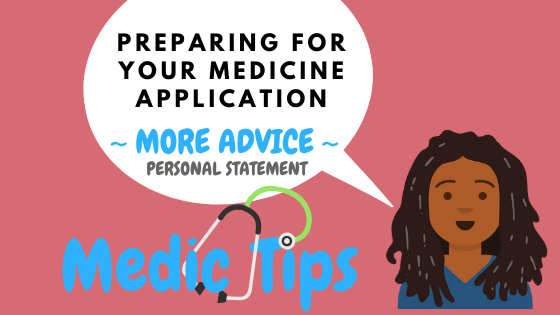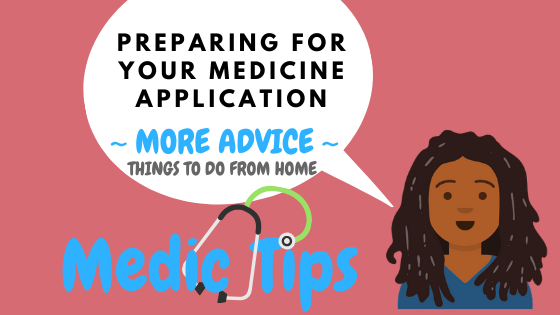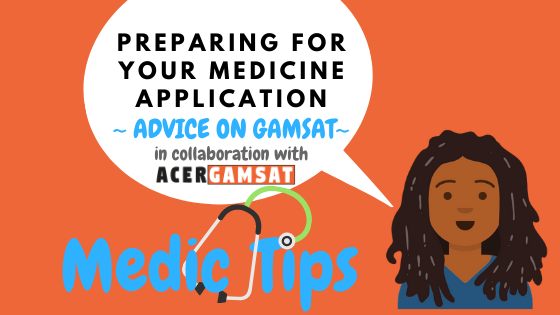Preparing for your medicine application – what do you need to do?
11 Ebrill 2020
Every year, the UCAS deadline for submitting an application for medicine is 15 October. So what should you be doing to meet this deadline? This blog is going to talk through the key elements of the application process and give some tips to highlight how you can start preparing!

So what is UCAS?
This is the platform where you apply to the medical schools that you have chosen, it officially shows the decisions of offers or rejections, then after hearing back from all of them, you choose your final 2 choices – firm and insurance (check out the links to my previous blogs on these!)
As a very quick overview, the key elements of the your UCAS application are:
- Your personal details – this includes some questions about finance and contextual information
- Course choices (remember only 4 for medicine + 1 can be backup or left blank)
- Full education history – all qualifications must be listed from secondary education – these can also include other achievements (e.g. I listed my music grades & diploma). You must also list the qualifications that you are awaiting results on – i.e. if you have not done your A levels yet, you still have to list your subjects that you are studying.
- Employment history – for paid jobs only
- Personal statement
- Reference – usually written by a teacher or a personal tutor at the end of the application when you send it off to them to review
Is there anything else you need to do?
For medicine, you will also be required to do an admission test – for Cardiff, they require the UCAT for undergraduates. Although there is a section to add in UCAT scores on UCAS form, your test scores are officially sent to the medical schools which is the data that they will use for accuracy.

I have done a detailed blog on All things UCAT, which goes through my process of preparation and some of my top tips; plus also links some other useful resources!

For graduates, you are required to do the GAMSAT. Although I haven’t done this exam myself, I am delighted to say that I have done a short blog about it with further advice in collaboration with AcerGAMSAT! Read here! I’ve provided some further detail about them below with some useful links to their services!
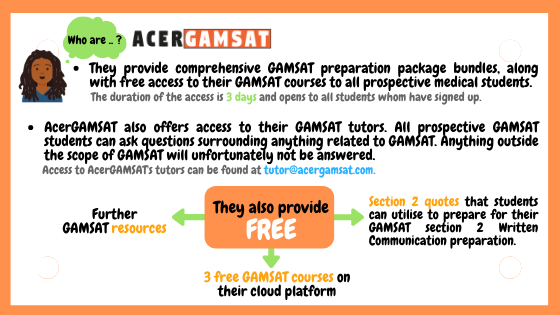
- Access to the courses are granted at the end of each month. Students will receive an email with instructions on how to access the courses nearer the time.
- Free GAMSAT courses will be available in the next couple of months: look out for them shortly here!
- Further GAMSAT resources: find here!
For each medical school that you apply to, ensure that you have read the admissions criteria thoroughly to check that you have the right qualifications and to have an understanding of their selection process. Often, the criteria will give guidance on what they are looking for which will be a great help for when starting your personal statement!
PERSONAL STATEMENT
I started planning my personal statement in August and ensured I had completed my first draft (out of 10!) before we started back in September so that I had a core to work on with my tutors. If you’ve just started thinking about applying to medicine, or perhaps haven’t even thought about choosing your medical schools yet, you may be thinking that I’ve skipped far too ahead to be talking about personal statement now. But actually I think it’s incredibly important that you have an understanding of your end goal, so that you start your preparation early!

Have a read of this summary checklist for elements to speak about on your personal statement – do you have answers for all of these? Chances are if you’ve just started thinking about medicine, you haven’t and that’s okay! I will speak on the last 3 questions to highlight how you can prepare to make sure you can tick all these boxes!
EXPERIENCE
It is important that you have “an insight into a career in Medicine” and have “evidence of experience and reflection in a caring environment”. These quotes are from Cardiff’s admission criteria, which hopefully you will have seen when reading it thoroughly (!), but actually this will apply to every medical school that you apply to. However, what may differ is that some medical schools may specify what experience that they want you to have, so please make sure that you check this with your other options.
Please note that the AND/OR that I have put in the checklist, because I understand how hard it can be to get work experience nowadays, in the sense of being able to do a clinical observations with a doctor. If you’ve read my journey, you will remember that I said that I applied for work experience at the start of Year 12. I actually had the placement 8 months later, which goes to show, with even my mum helping me to be proactive, there was still a massive delay.
With that being said, do not give up in trying into get a clinical observation. Even if it means that you have it after you submit your UCAS application, you can still mention it on your personal statement saying that you have it arranged. You could indicate what you are expecting to see and can easily throw in some buzz words -e.g. looking forward to seeing “interdisciplinary communication” firsthand.
Voluntary experience is incredibly useful as well, because it is usually easier and quicker to arrange, plus by doing it long term, you can demonstrate commitment. Often you get to do more in volunteering and develop more skills from it. I volunteered in a local hospice, which also gave me the opportunity to do free courses with them, which I spoke about in my personal statement as well.
I’ve added some ideas below as to where to look for experience, but I can appreciate these opportunities may vary where you live and other aspects to consider such as commuting to places, but if you start looking early, you will find something!
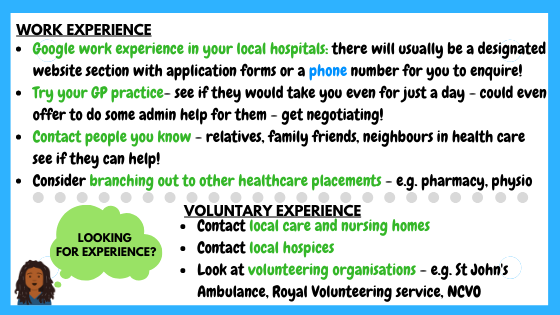
Finally, I just want to say about experience – it is not about the quantity, but the quality of your reflections from it. For example, it is all very well saying you managed to watch a surgery, but you have to dig deeper. What did you actually learn from it? Perseverance of long working hours; communication between operating staff etc.
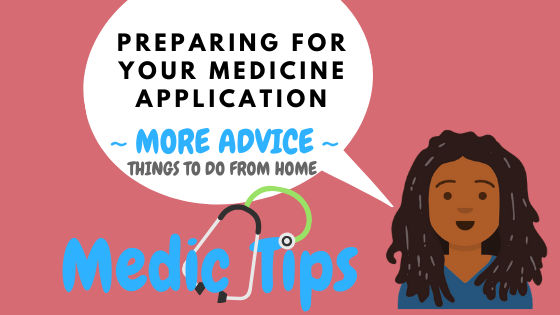
UPDATE: If you are reading this during COVID-19, please do not worry there are some virtual options for experience to consider – check out this blog about opportunities you can achieve from home!
ACADEMIC DRIVE
There is no doubt that medicine is a challenge – are you ready to rise up to that? Is there anything in your subjects that has fascinated you that you have gone out your way to do more reading on it?
I encourage you to develop an intellectual curiosity! Have a think about 1 or 2 topics from your A levels (or other qualifications) and see if there’s anything you can read which is more challenging for example a scientific paper, but take the time to understand it! There is no point quoting something you have read which a) you don’t understand & b) you didn’t actually find interesting – don’t do it just for the sake of it!

If you are also applying to traditional courses, they love to see that you enjoy reading – check out my reading recommendations blog – see if any of these give you some inspiration as well! They are great conversation points for interviews, however one thing I would say is keep some notes on what you have learnt about them.
EXTRA-CURRICULAR ACTIVITIES
At least one paragraph of your personal statement will be on extra-curricular activities – again just to stress don’t do them just for the sake of a medicine application. Many of you may already have activities that you have done for years and that’s great, another opportunity to show your commitment and determination! Here are some examples what they may entail, but there are many more:
- Sports teams
- Music – play an instrument, part of ensembles
- Other teamwork opportunities – D of E, other clubs/societies
- Leadership activities – prefect, NCS wave leader
- Tutoring
- Other: paid job – customer service experience- great for communication skills!
I’ve also mentioned work-life balance, because some of these activities you don’t necessarily do to rest! Have a think about what you do like to do to rest, because it is so important that you understand to prevent burnout!
I hope that this has been useful, but I want to encourage you to check out other great websites to get as much advice as you can for all aspects of the process. Please feel free to leave a comment or contact me via UniBuddy where I am more than happy to answer any other questions you have!
Please check out my follow up blogs where I go into more detail on how I prepared and give some useful tips!
- Advice for Students
- After University
- Ail flwyddyn
- Application Process
- Application Process
- Applying to University
- Arian
- Aros gartref
- Astudio
- Byw oddi cartref
- Cardiff University Experiences
- Chwaraeon
- Clearing
- Clybiau a chymdeithasau
- Cooking
- Cyd-letywyr
- Cymraeg
- Darlithoedd
- Dim ond yng Nghaerdydd
- Exams
- Global Opportunities
- Guest posts
- Heb ei gategoreiddio
- Medic Tips
- Mynd allan
- Neuaddau Preswyl
- Open Day
- Opportunities
- Postgraduate Study
- Rhentu tŷ
- Student Heroes
- Student Life
- Studying Online
- Swyddi a phrofiad gwaith
- Teithio
- Things to do in Cardiff
- Top Tips
- Trydedd flwyddyn
- UCAS Application
- Why University?
- Ymgartrefu
